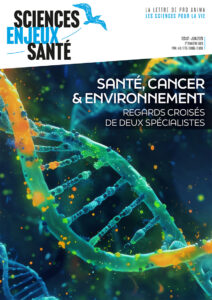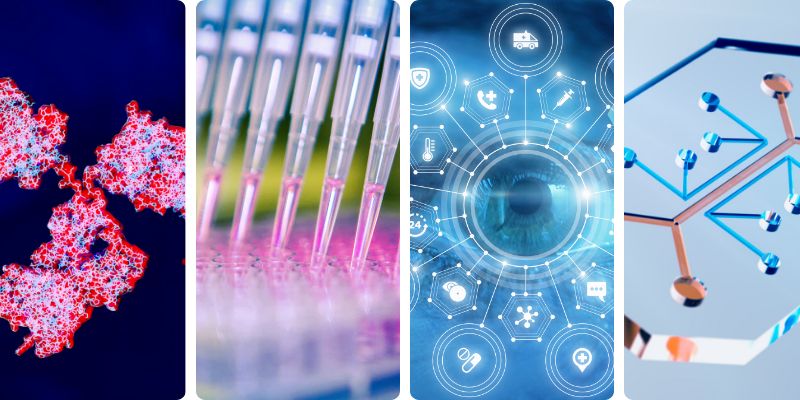
NAI Fellows Program to Dr. Milica Radisic, Report of the First ONTOX Stakeholder, Digital twins in biology and more
News on non-animal methods
Jan 22-26, 20241. Dr. Milica Radisic inducted as U.S. National Academy of Inventors (NAI) Fellow
Dr. Milica Radisic has been elected as a 2023 Fellow of US National Academy of Inventors (NAI), this achievement underscores her exceptional contributions to advancing research and positively impacting real-world applications.
The NAI Fellows Program honours the outstanding achievements of academic inventors who, through interdisciplinary collaboration, dedication, and innovation, have successfully translated their research into tangible commercial technologies that significantly enhance society. Being selected as an NAI Fellow represents the pinnacle of professional recognition for academic inventors.
As a distinguished Professor at the University of Toronto and Canada Research Chair in Organ-on-a-Chip Engineering, Dr. Milica Radisic has played a pivotal role in advancing the fields of organ-on-a-chip engineering and biomaterial development. Her notable contributions include leading the NSERC CREATE Training Program in Organ-on-a-Chip Engineering & Entrepreneurship and establishing the collaborative center, CRAFT, dedicated to the translation of organ-on-a-chip devices into practical products.
2. Report of the First ONTOX Stakeholder Network Meeting : Digging Under the Surface of ONTOX Together With the Stakeholders
The goal of the Horizon 2020 ONTOX project — ontology-driven and artificial intelligence-based repeated dose toxicity testing of chemicals for next generation risk assessment — is to provide a generic functional and sustainable solution for advancing the assessment of chemical risk to humans, without the use of animals, in line with the 21st century toxicity testing and next-generation risk assessment (NGRA) principles. This solution consists of a strategy to create new approach methodologies (NAMs), in order to predict systemic repeated dose toxicity effects that, in combination with tailored exposure assessment, will enable human risk assessment. The ONTOX definition of NAMs is as follows : an artificial intelligence-based strategy linked with a battery of in vitro assays and in silico tools for hazard prediction, to be combined with customised exposure assessment for the purpose of human risk assessment.
The stakeholder network meeting resulted in the identification of barriers, drivers and specific challenges that need to be addressed. It was concluded that there is a continued need for stakeholder engagement, including the organisation of a ‘hackathon’ to tackle challenges, to ensure the successful implementation of NAMs and PRA (Probabilistic Risk Assessment) in chemical risk assessment.
3. Digital twins in biology : transforming research and advancing the 3Rs
In science, digital twins make it possible to reproduce biological phenomena with great precision and great versatility. These innovative approaches have the potential to reduce – or even replace – preclinical animal models, paving the way for a more ethical trajectory in research methodologies.
In its article, the FC3R explained the three digital twin projects led by Inria that were presented at the EMBO “Digital tools” conference held in Sant Feliu de Guixol (Spain) in November 2023.
The work of Dr Anna Niarakis (University of Toulouse III-Paul Sabatier, Inria Saclay) who is developing a revolutionary digital twin model specifically adapted to rheumatoid arthritis (RA). Dr Dirk Drasdo and his colleagues, from Inria Saclay Île-de-France, are actively participating in the development of a digital twin of the liver, a complex organ that plays a crucial role in various bodily functions, including metabolism, pathways detoxification and blood sugar regulation. And the European EDITH-CSA project, presented by Liesbet Geris (VPH Institute, Europe) presented a collaboration between 23 partners, funded by the European Union’s Horizon Europe research and innovation program, in which Inria is involved.
Read the article by the FC3R (FR)
4. Cellcolabs announces partnership with REPROCELL : Global distributorship for research- and GMP-grade MSC and MSC derivatives
Cellcolabs AB, a spin-out of the Karolinska Institute specialized in manufacturing both research- and GMP-grade mesenchymal stem cells (MSC), and REPROCELL Inc., Japan’s first induced pluripotent stem cell (iPSC) company, have partnered to globally distribute the high-quality MSCs and MSC derivatives manufactured by Cellcolabs for research and clinical applications. This agreement also includes exclusive distribution in Japan.
5. Organ-on-chip : a comprehensive overview of international organ-on-chip courses
Dynamic42 proposes an interactive map to find organ-on-chip available courses and pick the one that suits researchers’ needs. The list of courses details the educational content, location, duration and provider. This list contains only providers offering theoretical as well as practical lectures.
6. NIH Follows PETA Scientists’ Recommendations for Boosting Non-Animal Research
So as to modernize science policy within the National Institutes of Health (NIH) to better support the use and uptake of non-animal research methods (also known as “new approach methodologies” or “NAMs”), the Science Advancement & Outreach (SAO) division of PETA repeatedly responds to NIH’s requests for information on these issues and sends letters to the agency’s leaders with our recommendations.
SAO scientists have recommended that NIH increase funding for and support of NAMs, and proposed several ways for NIH to do that, including developing specialized funding, changing and/or implementing new infrastructure, training NIH-funded scientists, and creating opportunities for collaborations between physicians and scientists.
On December 14, 2023, a special NIH working group on NAMs issued its recommendations to the NIH director’s advisory committee. The suggestions previously made by the SAO scientists were incorporated into many of the recommendations, which were unanimously accepted.
7. Q&A with Professor Hazel Screen : From bones to organ chips on Operation Ouch !
Co-directing the Queen Mary University of London (QMUL) Centre for Predictive in vitro Models, Professor Hazel Screen of the School of Engineering and Materials Science recently took on a new challenge : explaining the fascinating world of organ-chip technology to the young audience of Operation Ouch ! a YouTube channel that aims at “de-mistifying hospitals for younger viewers ; no longer will the hospital be a “scary” place to go as we learn all the exciting things that go on there”.
8. Upcoming webinars and conferences
- Jan. 30 — Mimetas, online : Imaging and Analysis for Comprehensive 3D Tissue and Disease Modeling
- Jan., 31 — Federal Agency for Medicines and Health Products (FAMHP), Antwerp, Belgium : Advancing 3Rs for Regulatory Testing of Medicines
- Feb. 2 — Centre for Predictive Human Model Systems (CPHMS), online : Single-cell transcriptomics of oral cancer : Novel Insights & New Horizons
- Feb, 7 — Senzagen, online : Spotlight on Difficult-to-Test samples
- Feb., 8 — NETRI, online : How to use the strength of compartmentalization for CIPN applications ?
- Feb. 20 — The Scientist, online : Using Brain Organoids in Human Health and Disease Research
- March, 1 — SaferWorldByDesign, Basel, Switzerland and online : NextGen Basel 1 — Next Generation Product Design and Risk Assessment
- March, 22 — CEHTRA, Paris, France : Paris workshop plus tutor-assisted eLearning (toxnavigation.com)
- March, 27 — AFSA Master Class, online : Transition to non-animal based vaccine batch release testing. Policy and regulations theoretical aspects and case studies


